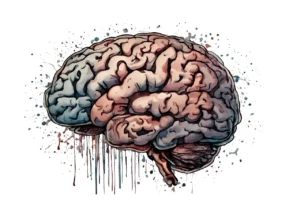“What is the cause of OCDs and what make OCD worse” let’s learn about this topic.The cause of OCDs are complex and include a genetic predisposition, neurological disorders, stressors in the environment, and cognitive issues. Its development is influenced by neurological disorders and genetic predisposition, and its symptoms are sustained by cognitive variables like maladaptive beliefs and external stressors like trauma. OCD is made worse by stress, sleep deprivation, substance misuse, exposure to triggers, and obsessive actions that support the idea that they are necessary for managing anxiety.
Personal Experience :what is cause of my OCDs
In this blog I need to share my experience what I feel and think that if someone ask what is my cause of OCDs then I would say it is Overthinking. I find myself mired in an unending cycle of overanalysing everything, turning every small occurrence into a subject of conjecture and analysis. It seems like my mind goes into repeat mode and won’t stop thinking about and worrying about things, no matter how unimportant they may seem. I’m finding it difficult to break out of this routine since it’s stressful and draining.
The complex interactions between individual experiences and more general psychological phenomena will be discussed in this blog, providing insight into the various factors that can lead to OCD symptoms. By utilising both scientific evidence and human accounts, our goal is to present a thorough explanation of OCD along with suggestions for useful coping mechanisms and therapies.
Fear of dying
My fear of dying was so great as a child that it affected all part of my existence. I would become extremely anxious at the slightest mention of disease or death, as I struggled with the dreadful idea of both my own and my loved ones’ impending deaths. This fear turned into a lifelong companion that followed me everywhere I went, causing me to obsessively think, feel anxious, and engage in compulsive behaviours.
Fear of getting out of house
A major contributing factor to my OCD was a deep-seated fear of leaving the security of my home. I developed a severe fear of the outside world, seeing every step past my front door as a potential source of misfortune. My fear of the unknown paralyzed me, making me believe that danger was around every corner. I became more and more withdrawn into the safety of my home in an effort to protect myself from perceived threats as a result of this dread, which resulted in avoidance habits.
The hypochondria
Another OCD symptom that increased my worry of getting sick and dying was hypochondria, or health anxiety. Each little ache, pain, or symptom became a cause for concern, setting off a chain reaction of dire thoughts and obsessive activities. I developed a hypervigilant attitude toward my health, constantly observing my body for indications of disease and seeking comfort from medical experts to allay my concerns.
Perfectionism and self control
My battle with OCD became centered around perfectionism and the drive for control. The constant quest of perfection turned into a double-edged sword that made me aim for impossibly high standards while also making me more anxious in the face of uncertainty or flaws. No matter how little the decision, I was always doubting and second-guessing everything because I was trying so hard to regulate my surroundings to calm my inner chaos.
Let’s learn what is the cause of OCDs and what make OCD worse
Genetic propensity
Understanding genetic influences-The onset of OCD is mostly influenced by genetic factors. According to research, people who have a family history of OCD are more likely to experience the disorder themselves. Studies have indicated that certain genetic variants may enhance vulnerability to OCD, even if particular genes linked to the disorder have not yet been conclusively discovered. Neurotransmitter function and brain circuitry are two examples of the neurobiological processes linked to OCD that may be impacted by these hereditary traits.
Identifying candidate genes-Recent developments in genetic studies have clarified that OCD is inherited. Research has revealed putative candidate genes that might raise the likelihood of getting OCD. For instance, OCD susceptibility has been linked to the SLC1A1 gene, which codes for a protein involved in glutamate control. Changes in this gene could throw off the neurotransmitter balance in the brain and cause OCD symptoms to appear.
Evidence from twins and family studies-the strong proof of OCD’s heredity has been offered by twin and family studies. The idea that genetic factors play a major part in the development of OCD is supported by the fact that monozygotic twins, who share identical genetic material, have a greater concordance rate for the condition than dizygotic twins. The fact that family members of OCD sufferers have a higher chance of getting OCD themselves emphasizes the disorder’s genetic basis.
Abnormalities in nervous systems
The Architecture and Function of the Brain–Studies using neuroimaging have shown that OCD sufferers have anomalies in the structure and function of their brains. The orbitofrontal cortex and striatum, which are involved in impulse control, mood management, and decision-making, exhibit changes in OCD patients. While functional MRI studies have revealed aberrant connectivity within neural circuits, such as the cortico-striatal-thalamo-cortical circuitry, structural MRI investigations have revealed changes in brain structure.

Learnings from Brain Imaging Research-Cutting-edge neuroimaging methods have shed light on the brain mechanisms behind OCD. OCD patients have anomalies in their cortical thickness and gray matter volume, according to structural MRI studies. Functional MRI studies have shown that abnormal neural circuit activity contributes to symptoms of OCD, including intrusive thoughts and repeated actions.
Neurotransmitters’ role-OCD has been linked to glutamate, dopamine, and serotonin dysregulation, among other neurotransmitter dysregulations. For instance, the effectiveness of serotonin reuptake inhibitors (SRIs) in easing symptoms has been connected to abnormalities in serotonin signaling, which may be the cause of OCD. The disorder’s intricate interaction with several neurotransmitter systems is highlighted by the involvement of dopamine dysregulation and glutamate abnormalities in OCD.
Environmental stressors
Effects of Trauma in Childhood- Stressors from early childhood, such as emotional or physical abuse, can raise the likelihood of having OCD in later life.This is the major cause of OCD.Abnormal psychological development is disrupted by traumatic experiences, which also lead to the development of maladaptive coping mechanisms, such as obsessive-compulsive behaviors. Childhood trauma has been associated with changes in the structure and function of the brain, which emphasizes its effect on the development of OCD.

Life Stressors’ Impact–This is the major cause of OCDs.Stressful life situations, like relationship problems or academic pressure, might set off or worsen OCD symptoms in those who are vulnerable. When coping mechanisms are overtaxed by chronic stress, anxiety levels rise and OCD symptoms manifest as a maladaptive reaction to stress. Genetic susceptibilities and environmental stressors combine to influence a person’s likelihood of developing OCD.
Social and Cultural Aspects–OCD experiences can be influenced by societal attitudes toward cleanliness, orderliness, and religious beliefs as well as cultural standards. When it comes to how OCD symptoms are expressed and interpreted, cultural context is crucial. In order to provide culturally appropriate interventions and address the particular difficulties faced by OCD sufferers, it is imperative to comprehend the affects of culture.
Acquired attitudes
OCD and family dynamics–Children’s development of OCD can be influenced by parenting approaches and family dynamics. The onset of OCD symptoms may be influenced by too strict or critical parenting methods, as well as views within the family toward hygiene. Furthermore, OCD can be passed down across generations if parents mirror their own tendencies in their offspring.
societal norms and peer pressure–In particular during adolescence, OCD experiences might be shaped by peer pressure and cultural standards. Excessive activities to fit in or avoid social rejection might be a result of OCD symptoms being exacerbated by peer pressure and social expectations. Preconceptions and misconceptions about OCD can be reinforced by media representations of the condition.
Views of OCD Affected by the Media–Images of OCD in the media have the power to shape public opinion and increase stigma. Help-seeking habits and the general public’s knowledge of OCD might be impacted by inaccurate or stigmatizing depictions of the condition. Understanding and stigma reduction are largely dependent on media literacy and truthful depictions of OCD.
